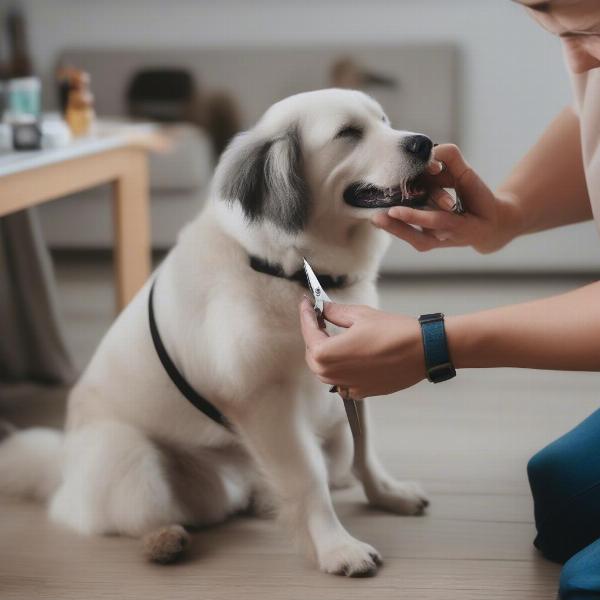Dogs chewing their nails can be a common sight, but it’s not always a harmless habit. Understanding the reasons behind this behavior is crucial for ensuring your furry friend’s well-being. This article will explore the various causes of nail-biting in dogs, from simple boredom to underlying medical conditions, and provide practical advice on how to address this potentially problematic behavior.
While some nail-biting might be attributed to regular grooming, excessive chewing can indicate an issue. So, why do dogs chew their nails? Let’s delve deeper.
Common Causes of Nail Chewing in Dogs
Allergies
Just like humans, dogs can suffer from allergies, which can manifest in itchy paws. Environmental allergens like pollen, dust mites, and certain grasses can trigger this reaction, leading to excessive licking and chewing of the paws and nails. Food allergies can also be a culprit.
Anxiety and Boredom
Anxiety and boredom can lead to a variety of behavioral issues in dogs, including nail-biting. Dogs left alone for extended periods, lacking mental stimulation, or experiencing stressful situations may resort to nail chewing as a coping mechanism.
Injury or Infection
A nail bed injury or infection can cause discomfort and pain, prompting a dog to chew on the affected nail. Look for signs of swelling, redness, or discharge around the nail. black spots on dogs paws can sometimes indicate an issue.
Parasites
Parasites like fleas, ticks, and mites can infest a dog’s paws, causing intense itching and irritation. This can lead to excessive licking and chewing of the paws and nails.
Nutritional Deficiencies
While less common, nutritional deficiencies can also contribute to nail-biting. A lack of certain vitamins and minerals can weaken the nails, making them more prone to breakage and chewing.
Addressing Nail Chewing in Dogs
Veterinary Examination
The first step in addressing nail chewing is to consult with a veterinarian. They can determine the underlying cause of the behavior and recommend appropriate treatment. This might include allergy testing, parasite control, or medication for infections.
Environmental Enrichment
Providing a stimulating environment for your dog can help alleviate boredom and anxiety. This can include interactive toys, puzzle feeders, and regular exercise. Having a dog on a sofa with you can also provide comfort and reduce anxiety.
Behavioral Modification
If anxiety is a significant factor, behavioral modification techniques can be helpful. This may involve desensitization and counter-conditioning exercises or even medication prescribed by a veterinarian.
Proper Nail Care
Keeping your dog’s nails trimmed to an appropriate length can help prevent breakage and reduce the temptation to chew. Regular grooming can also help identify any potential issues early on.
 Dog getting its nails trimmed
Dog getting its nails trimmed
“Identifying the underlying cause of nail-biting is key,” says Dr. Emily Carter, DVM. “Don’t just treat the symptom; address the root of the problem.”
“Environmental enrichment and regular exercise are essential for preventing boredom-related nail chewing,” adds certified dog trainer, Mark Johnson. “A tired dog is a happy dog, and less likely to engage in destructive behaviors.”
Conclusion
Nail chewing in dogs can be a sign of various underlying issues, from allergies to anxiety. Addressing this behavior requires identifying the root cause and implementing appropriate strategies, which may involve veterinary care, environmental enrichment, and behavioral modification. By understanding why your dog chews its nails, you can help them live a healthier, happier, and more comfortable life.
FAQ
-
Is nail chewing in dogs always a sign of a problem? While some nail chewing can be normal grooming behavior, excessive chewing often indicates an underlying issue.
-
What should I do if I notice my dog chewing its nails excessively? Consult with a veterinarian to determine the cause and appropriate course of action.
-
Can I use bitter apple spray to stop my dog from chewing its nails? While bitter apple spray can deter chewing, it’s crucial to address the underlying cause of the behavior rather than just masking it.
-
How often should I trim my dog’s nails? This varies depending on the breed and individual dog, but generally, nails should be trimmed when they start clicking on the floor.
-
Can anxiety medication help with nail chewing in dogs? If anxiety is a contributing factor, your veterinarian may prescribe medication as part of a comprehensive treatment plan.
-
What are some signs of a nail bed infection in dogs? Look for redness, swelling, discharge, and lameness.
-
Are certain dog breeds more prone to nail chewing? While any dog can chew its nails, some breeds may be more predisposed to anxiety or allergies, which can contribute to this behavior.
Related Articles
About ILM Dog
ILM Dog (https://ilmdog.com) is your one-stop resource for expert advice on all aspects of dog care, from breed selection and puppy care to senior dog health and behavioral training. We provide practical, evidence-based information to help you nurture a happy, healthy, and well-behaved canine companion. For personalized guidance on dog nutrition, grooming, or product recommendations, contact our team of experts at [email protected] or call us at +44 20-3965-8624.